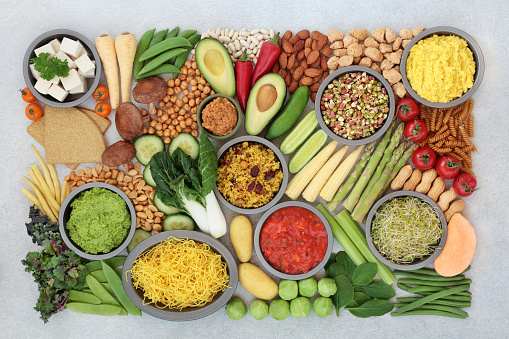Are you worried about managing your health and weight while helping make the environment more sustainable? With the rise of processed foods and a fast-paced lifestyle. Maintaining a healthy diet may be difficult. Consider having chronic conditions and being overweight. And simultaneously contributing to the destruction of the planet’s ecosystems.
Numerous people require assistance with this. Embracing a plant-based diet may help with both health and environmental problems. Continue reading to discover how switching to a plant-based diet will help you achieve excellent health and contribute to a more sustainable future.
Consuming primarily whole foods from plant sources has been shown in research to reduce weight and decrease blood pressure. And a lower risk of chronic illnesses like heart disease, cancer, and diabetes. Below are the benefits of a plant-based diet that make it a safe and effective option for individuals of all ages.
A. Reduced risk of chronic diseases
Plant-based diets have been linked to a lower risk of chronic illnesses, including heart disease, diabetes, and cancer. These diets emphasize eating whole, unprocessed plant foods such as fruits and vegetables, whole grains, legumes, nuts, and seeds. Anti-inflammatory foods help in the reduction of inflammation in the body. Which has been related to the development of chronic illnesses.
Overall, a plant-based diet helps lower the risk of chronic illness by encouraging a healthy body weight, reducing inflammation, and supplying the body with essential nutrients and antioxidants.
B. Weight management
Plant-based diets are helpful for weight control owing to various factors. Firstly, they have fewer calories as they are often higher in fiber and lower in energy density. Secondly, they tend to minimize overeating by promoting feelings of fullness and pleasure. By adding non-starchy veggies, excellent quality protein sources, and balanced meals, vegetarian diets help to reach weight control objectives.
C. Improved gut health
Vegan diets contain fiber and antioxidants that improve gut health. The gut microbiome can significantly impact various areas of health, such as the immune system, metabolism, and mood.
A diet rich in plant-based foods, such as fruits, vegetables, legumes, and whole grains, supports gut health and the microbiome. The microbiome breaks down fibre, produces essential nutrients, and regulates inflammation. Therefore, following a plant-based diet that includes a variety of plant foods can improve gut health and overall health.
D. Better digestion
Consuming plant foods rich in fiber promotes regular bowel movements and prevents constipation. Vegetarian diets are high in fiber, vitamins, minerals, and phytonutrients, all supporting healthy digestion.
Fiber helps keep food moving through the digestive tract. While vitamins and minerals help to nourish the lining of the gut and promote a healthy metabolism. Phytonutrients provide antioxidants for better absorption of nutrients from food.
E. Improve immune system
A plant-based diet has been shown to improve immune system health. Consuming more plant-based foods enhances the body’s infection resistance and reduces the risk of developing chronic diseases.
The vitamins and minerals, phytochemicals, and antioxidants in plants help keep your cells healthy. They also balance your body so your immune system can work optimally.
Sustainability Benefits of a Plant-Based Diet
A vegetarian diet has various health advantages, but it also offers substantial sustainability benefits. By lowering the use of animal products, consumers may drastically lessen their carbon footprint, minimize deforestation, and decrease water pollution. In this context, let’s examine the sustainability benefits of a plant-based diet.
A. Lower carbon footprint
A plant-based diet minimizes carbon footprint by lowering greenhouse gas emissions connected with animal husbandry. Plant-based diets take fewer resources to produce and create fewer greenhouse gases than animal agriculture.
For example, producing a pound of beef requires 20 times more land and has 20 times more greenhouse gases than a pound of tofu. By adopting this diet, people may lower their carbon footprint and help the battle against climate change.
B. Reduced water consumption
A plant-based diet reduces water consumption in several ways, such as reducing animal product consumption and water pollution caused by animal agriculture. It also reduces the pressure on freshwater resources, which are becoming increasingly scarce in many parts of the world. Plant-based diets help to conserve freshwater resources and ensure their availability for future generations.
Practical Tips for Adopting a Plant-Based Diet
A. Start with small changes
Small changes such as adding Meatless Monday to your meal plan and trying one new plant-based recipe each week are significant to adopt a plant-based diet. Stocking up on essentials like beans, whole grains, legumes, fruits, and vegetables is also important. As you identify your favourite recipes, you can add them to your meal rotation and increase the number of plant-based meals you consume.
B. Increase vegetable and fruit intake
To adopt a vegan diet, increasing your consumption of vegetables and fruits is vital. Stocking up on fresh vegetables and integrating them into your meals, snacks, and smoothies might make the transition simpler. Experiment with different dishes and aim to incorporate a range of colourful fruits and vegetables into your diet.
C. Substitute plant-based proteins for animal-based proteins
Replacing animal-based proteins with plant-based alternatives is crucial to effectively adopting a vegetarian diet. Adding foods like legumes, nuts, seeds, tofu, and tempeh into your meals may supply the required protein and aid with the adjustment. Experiment with various recipes to uncover tasty and fulfilling plant-based protein sources.
D. Plan your meals ahead of time
Planning meals, choosing a variety of whole foods, packing your meals and snacks, and experimenting with new recipes are essential tips for adopting a plant-based diet. Planning meals helps to ensure nutritious and delicious meals while choosing whole foods helps to get all the vitamins and minerals your body needs.
Packing meals and snacks help to ensure healthy and convenient options when on the go. Experimenting with new recipes can help to make plant-based eating more enjoyable and keep things interesting.
Misconceptions of Plant-Based Diet
A. Concerns about protein intake
One prevalent misperception regarding a plant-based diet is that it may need to supply adequate protein, an essential macronutrient for the body. Yet, a plant-based diet may quickly satisfy protein demands with careful planning and food selections. In reality, many plant-based athletes and bodybuilders have successfully attained their fitness objectives while following a plant-based diet.
B. Availability and cost of plant-based foods
Another myth about a plant-based diet is that it may be more costly and challenging than a regular diet. Plant-based diets are very economical and accessible. Mainly when focused on whole foods like grains, legumes, and vegetables. Preparing meals and purchasing in bulk can help save expenses. Many grocery shops and restaurants now offer a range of plant-based choices.
C. Social challenges and pressure
A misperception regarding a plant-based diet is that it may be socially problematic and lead to pressure. Yet, many restaurants and social gatherings now provide plant-based alternatives. There are online forums and support groups where individuals may interact and share experiences. Personal eating preferences should be honoured.
Takeaway
In conclusion, a plant-based diet provides many sustainability and personal health advantages. This diet helps maintain a healthy weight, improve digestion and gut health, lower the risk of chronic illnesses, and strengthen the immune system.
Moreover, plant-based diets significantly affect sustainability by cutting greenhouse gas emissions, using less water, and preserving natural resources. Little adjustments are essential for a smooth transition to a plant-based diet, such as beginning with meatless Mondays and gradually increasing vegetable and fruit consumption.
It’s also crucial to include plant-based proteins like those found in seeds, nuts, and legumes. This diet change may be made more straightforward and more fun by planning meals, trying new recipes, and storing up on necessities. People may improve their health and help ensure a more sustainable future for the earth by adopting a plant-based diet.
[ad_2]






Leave a Reply